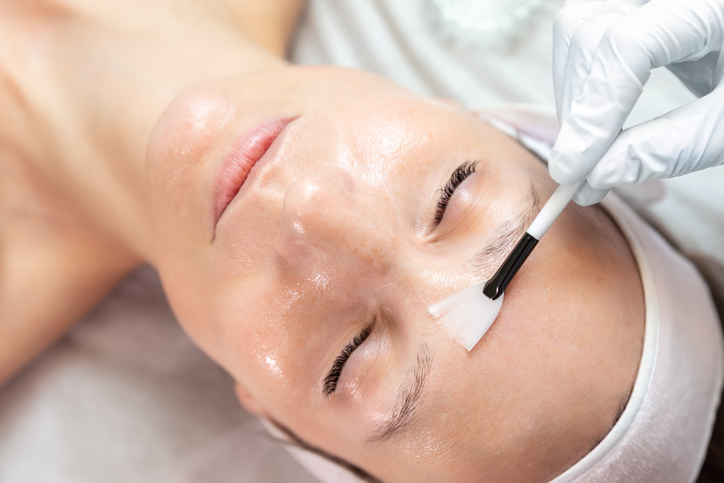In the pursuit of healthy, radiant skin, many individuals turn to various skincare treatments. One such popular and effective option is a chemical peel. Chemical peels have gained significant recognition in recent years for their ability to revitalize and enhance the skin’s appearance. This article aims to explore the positive effects of chemical peels, shedding light on their benefits and how they can transform your skin.

What is a Chemical Peel? A chemical peel is a cosmetic procedure that involves applying a chemical solution to the skin, causing it to exfoliate and eventually peel off. This process stimulates the growth of new skin cells, resulting in a smoother, more even-toned complexion. Chemical peels can be customized to address various skin concerns, including acne, hyperpigmentation, fine lines, wrinkles, sun damage, and uneven texture.
Positive Effects of Chemical Peels:
- Exfoliation and Skin Renewal: Chemical peels provide a controlled exfoliation process, removing dead skin cells and allowing fresh, healthier skin to emerge. This renewed skin surface appears brighter, smoother, and more youthful. Regular peels can improve skin texture, reduce the appearance of acne scars, and enhance overall skin tone.
- Diminished Wrinkles and Fine Lines: As we age, fine lines and wrinkles become more noticeable. Chemical peels, particularly those containing alpha-hydroxy acids (AHAs) or trichloroacetic acid (TCA), promote collagen production, which helps plump and tighten the skin. By stimulating collagen synthesis, chemical peels can reduce the appearance of wrinkles, crow’s feet, and expression lines, resulting in a more youthful complexion.
- Reduction of Hyperpigmentation: Hyperpigmentation, such as age spots, sunspots, and melasma, can significantly affect the skin’s appearance. Chemical peels, especially those with ingredients like glycolic acid and salicylic acid, work to lighten and even out skin tone by targeting excess melanin production. Regular peels can fade hyperpigmentation, revealing a more uniform complexion.
- Treatment of Acne and Acne Scars: Chemical peels can be an effective adjunct treatment for acne and acne scars. By exfoliating the skin’s surface, peels unclog pores, reducing the occurrence of breakouts. They also promote cell turnover, which aids in the fading of acne scars and post-inflammatory hyperpigmentation.
- Improved Skin Texture and Radiance: Chemical peels help refine the skin’s texture by reducing roughness, minimizing enlarged pores, and promoting a smoother surface. This leads to improved light reflection, giving the skin a radiant and healthy glow. With regular peels, skin texture becomes more even and supple.
- Boosted Skincare Product Penetration: Chemical peels remove the top layer of dead skin cells, allowing skincare products to penetrate more effectively. By eliminating this barrier, the active ingredients in serums, moisturizers, and treatments can better reach the deeper layers of the skin, maximizing their benefits and enhancing overall efficacy.
Chemical peels offer a range of positive effects for the skin, making them a popular choice for individuals seeking to rejuvenate their complexion. From exfoliation and skin renewal to diminishing wrinkles, reducing hyperpigmentation, and improving skin texture, chemical peels have the potential to transform your skin, leaving it looking revitalized and youthful. However, it is essential to consult with a dermatologist or skincare professional to determine the appropriate type and strength of peel for your specific skin concerns and to ensure proper aftercare for optimal results.
If you need help improving your skin, or would like to work with one of our professional skin technicians call our office (623) 334-6700.


